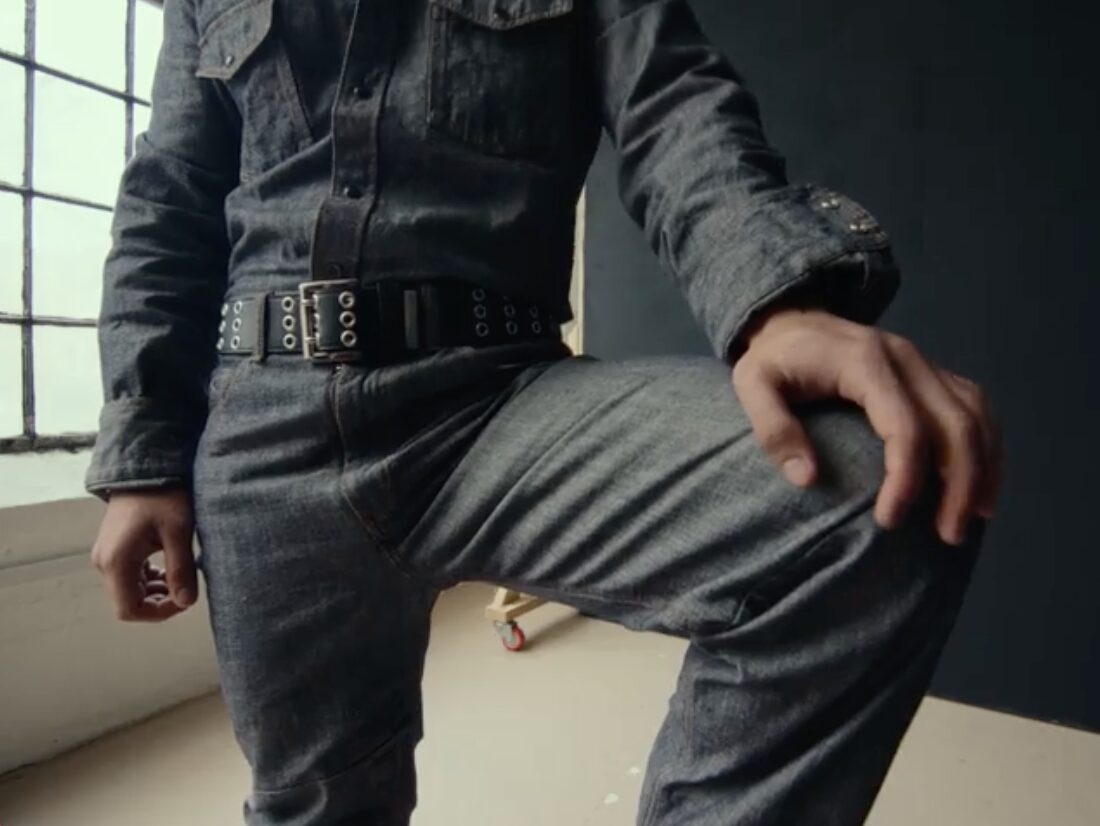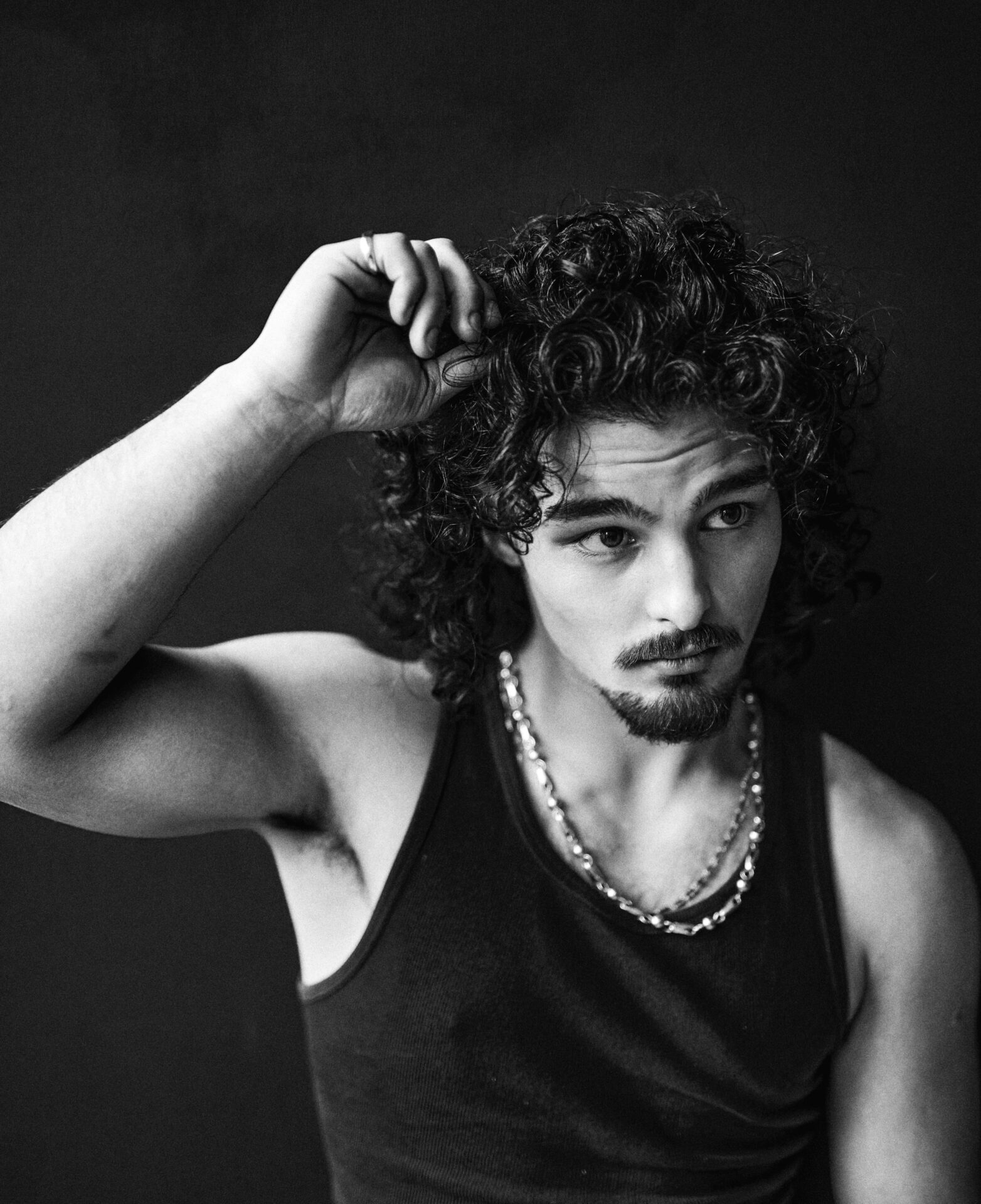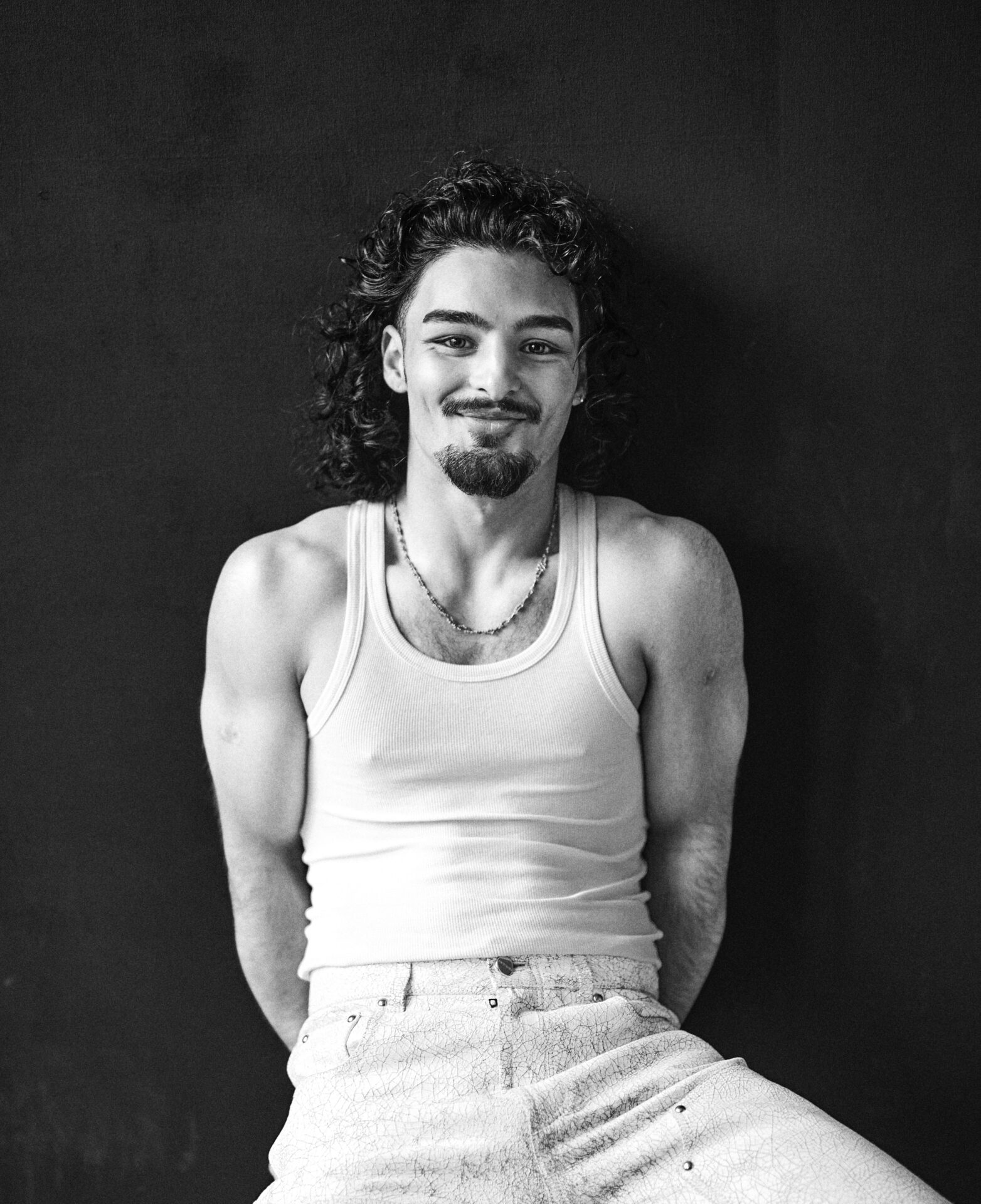Thanks to Dylan Bachelet, Baking Has Never Been This Cool.
WRITER: Chris Saunders
When you think of The Great British Bake Off contestants, “cool” is probably the last word that comes to mind. With an average age of 37 and a premise built around, well, baking, the show isn’t exactly a breeding ground for trendsetters. But that’s what makes it all the more fascinating when a contestant is cool – it’s like spotting a penguin in the desert. Unexpected, a little out of place, but undeniably intriguing.
Enter Dylan Bachelet. The 21-year-old who became an overnight sensation on the show’s 15th series in 2024, finishing as runner-up but cementing himself as its breakout star. His culinary talent was undeniable, but it was his aesthetic that really set him apart. With his flowing locks, signature goatee, and a bandana or baker boy cap perpetually perched on his head, he was quickly dubbed “the Captain Jack Sparrow of baking.” He didn’t just bring skill to the tent – he brought style.
Bachelet is far from just a pretty face, though. Throughout the series, he won two Star Baker accolades and three technical challenges – record-breaking numbers. When it comes to his culinary skills, he takes heavy inspiration from his family heritage, with his mother being Indian and his father Japanese-Belgian, alongside pulling from his experiences travelling during his gap year. His inventive approach saw him push the boundaries of Bake Off’s typically cosy creations, delivering ambitious, high-concept bakes that blended global flavours with bold artistic vision. From an Egyptian canopic jar cake to a gravity-defying hanging masterpiece inspired by Murano’s crumbling plasterwork, his work was as much about storytelling as it was about taste.
Rather than cashing in on his reality TV fame with cookbooks or influencer deals, Bachelet has opted for something more hands-on. He’s now working as a Chef de Partie at The Five Fields, a Michelin-starred modern British restaurant in Chelsea. Known for its meticulous attention to detail and emphasis on seasonal ingredients, The Five Fields is a far cry from the playful chaos of the Bake Off tent. Here, precision is everything, and mistakes come at a cost.
It’s a steep learning curve, but one Bachelet is embracing. Unlike the tent, where he had the freedom to experiment, professional kitchens demand consistency, speed, and an ability to perform under relentless pressure. But for someone who thrives on pushing himself creatively, it’s the perfect environment to refine his skills. He’s swapped the pastel workstations and gentle encouragement of Paul Hollywood for the adrenaline of a fine-dining brigade, where every dish must meet the exacting standards of both head chefs and discerning diners.
Chris Saunders: So, to start off, I wanted to get a bit of a gauge on the first moment you realised you had a passion for cooking. What was that moment for you?
Dylan Bachelet: I think I really noticed that I had an inkling I wanted to do it during lockdown, but then I did my A-levels, went to uni, and then I dropped out – that’s when I knew I really wanted to do it. I didn’t want to carry on working and doing a degree only to end up in a job that I knew I didn’t really want to do.
CS: Do you remember the first dish you ever made?
DB: I remember one of the first things I ever tried to make by myself – my mum used to make this thing called lemon sauce when I was a kid. I just used to have it on everything. It’s lemon, garlic, and olive oil blended up to make almost like a dressing. And because I loved it, I just thought, “Oh, I’ll make it myself.” I was pretty young at the time, and I didn’t peel the garlic properly – I left a lot of the skin on, so it tasted horrible. There were just all these chunks of garlic skin that wouldn’t blend up. But that was probably one of the first things I remember making by myself.
CS: Things have definitely improved since then! You were the runner-up in Bake Off – what pushed you to apply for that?
DB: With Bake Off, I just applied on a whim. I was at uni, and everyone was saying, “Why don’t you just apply?” I didn’t think I would even make it past the first stage, to be honest. I just kept going, stage after stage, until I got to the final audition. And then they said, “If you do well on this, you’ll be on the show.” I didn’t really think of it as a big decision at the time. I wasn’t like, “Oh, is this the right decision for me?” It was more like, “This is a rare opportunity – I should go for it.” Looking back, it was one of the biggest decisions I’ve made, but at the time, I took it really lightly. I just did it. And because I kept getting through the stages, I carried on with it. It was a very spontaneous decision.
CS: Now that the show is over, you’ve gained over 200,000 followers on Instagram. How has it been adjusting to all these new eyes on you?
DB: At the beginning, I didn’t think about it at all. I just thought I’d carry on as normal. But now that time’s gone on and the show’s ended, now it’s just me – I have to create my own image. There isn’t a show doing that for me anymore. It’s weird because I wouldn’t say it showed a different perception of me, but I never really used social media much before. Before I went on the show, I never posted pictures of myself – I wasn’t a very public person. And then suddenly, I was on TV, and people had an idea of who I was. And it is fun, I do enjoy the social media aspect, but it’s so different from what I would have done if I hadn’t been in this situation. I’ve tried to be as authentic as possible, but I also realise now that people have an image of me from Bake Off that isn’t 100% me.
Other people talk about how social media is idealistic and that you shouldn’t try to live up to it because it’s not real. I never really felt that before when looking at other people’s profiles, but now I feel it when I look at myself. I see my own social media and think, “Bloody hell, that guy looks perfect.” But I know that’s not the reality [laughs].
CS: I can imagine it’s an almost impossible task. You can’t go too much one way or the other – but it’s all a learning process. I read in an interview that you’re working at The Five Fields in Chelsea. Are you still working there now? And were you there before Bake Off?
DB: Yeah, I’m still working there. I think I applied for this job before the show even started airing, but I did my trial as the show was coming out.
CS: And what’s the biggest difference between working in a kitchen like that compared to Bake Off?
DB: The difference between here and Bake Off is – the show is very calm, right? I mean, it’s not that the kitchen isn’t calm, but Bake Off comes with different expectations. The expectations were all my own. If things didn’t go right, it was annoying, but it wasn’t the end of the world. Whereas here, if things don’t go right, it’s not just my own expectations – it’s the restaurant’s. That’s why it has a Michelin star. You have to uphold those standards, and there’s pressure to do that. That’s part of the job. It’s not like Bake Off, where you can turn up and mess up, and it’s fine. Here, if something goes wrong, it really matters.
The Bake Off tent, for me, was really calm – I was just having fun. But in a professional kitchen, it’s much more intense. It’s still fun, especially once you start getting to grips with things, but when I first started, it was a real challenge.
CS: I think it’s fair to say you gained a bit of a sex-symbol status on the show. How do you feel about fans and the media putting that label on you? I imagine it’s not something you expected when applying for a cooking show!
DB: I didn’t really expect it at all [laughs]. I suppose that’s probably the right answer to say, but it’s also the truth. I didn’t think anything like that would come from it. I didn’t think people would pay much attention to me in comparison to the other contestants. I remember being on the show and just being myself, but all this stuff started coming, like you said, all this “hot heartthrob” kind of thing. I don’t mind it, but I wouldn’t say I enjoy it or lean into it. Nothing’s come of it that’s been creepy or anything, so I don’t have a problem with it. But I don’t see myself in that way.
CS: Have you ever used your culinary skills to impress a date?
DB: I haven’t, actually. I’m honestly really bad with girls. I haven’t cooked on a date – ever. And I barely ever meet up with girls to do that kind of stuff [laughs]. So no, unfortunately, I haven’t!
CS: You mentioned earlier about dropping out of your degree – how did your family feel about that? Were they always supportive of you pursuing cooking?
DB: They were very supportive. My mum was a fashion designer, and my dad actually dropped out of uni when he was younger. So they understood. My mum always told me, “Whatever you do, just do it to the best of your ability.” And that really stuck with me, especially when I was deciding whether to drop out. They could see I was miserable at uni, even when I didn’t realise it myself. My mum would visit me and be like, “Are you sure you want to stay here? You don’t look happy.”
CS: So, in terms of the future, what does that look like for you? You’ve got an amazing job in the industry, you’ve been on TV, you’ve got a big social media following. But is there one sort of avenue you’d like to focus on?
DB: My plan is very much not a plan, but I have a goal, which has been my goal for ages. I want to open a restaurant, get some [Michelin] stars, and just make some really good food. But my immediate plan is just to take things as they come – which is proving to be a worse strategy than I originally intended. Taking things as they come is very hard when things come in quickly, without much time to deal with them. But the opportunities that Bake Off has given me have been amazing, and I’ll always be super grateful for that. My focus will always be on food. Any opportunities I can get from the show to improve my cooking and knowledge of food – that’s where I want to position myself. That’s my main goal – just learn as much about food as I can and be able to create it.
PHOTOGRAPHER Bartek Szmigulski
VIDEOGRAPHER Bohdan Rohulskyi
STYLIST Justin Hamilton
STYLIST ASSISTANT Lorna Lane
HAIR STYLIST Lee Patrick Devlin
GROOMING Rosie McGinn
STUDIO MANAGER Karolina Wielocha
STUDIO The Nook


